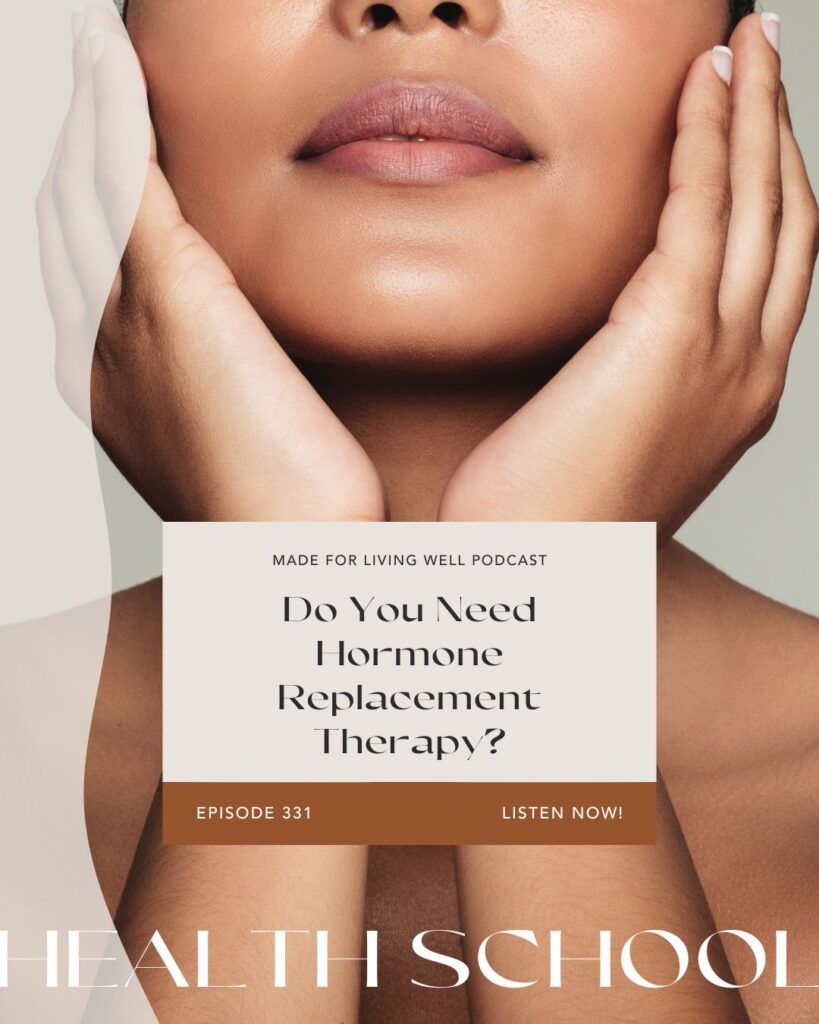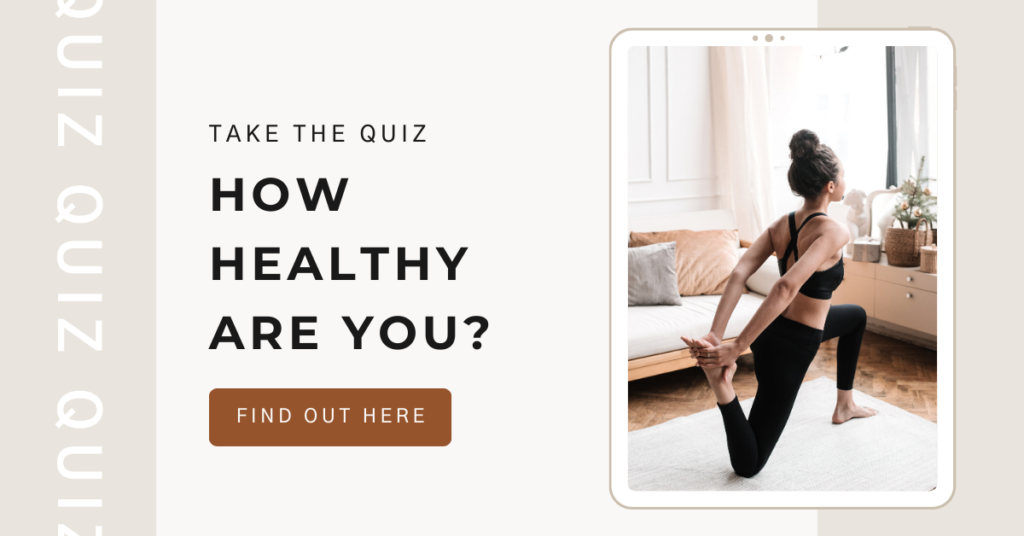
Listen on iTunes | Listen on Spotify | Listen on YouTube | Review the Podcast
Today, I interviewed Dr. Jolene Brighten, asking her all of your hormonal questions, including if you should take hormone replacement therapy, how to prepare for menopause, how to tell when you’re in perimenopause, what blood sugar has to do with your hormones, and so much more. Listen to the podcast and check out Dr. Brighten’s latest book, Is This Normal: Judgement-Free Straight Talk About Your Body.
Hormone replacement therapy is becoming increasingly common. The conversations are so familiar it feels like if you’re not on hormone replacement therapy, you might be doing something wrong.
It’s the same for all other hormones. Everywhere you look, someone else is telling you they’re a problem, making you assume you have a problem, even if you don’t.
I’d even argue that hormones are one of the most wrongfully villainized body processes today. But that’s a story for another day. The reality is that we encounter a lot of chatter about hormones. Nearly all of it is negative, making you believe that you probably have some hormonal problem, even if you don’t.
I know all too well it’s easy to fall into this predicament. Not long ago, I found myself questioning if my hormones were the problem and perhaps I needed some form of external therapy to fix it.
But what I know about the body is what might seem like a problem is often compensation for a deeper root issue. These issues might appear to begin with sex hormones, but most start further down the hormonal hierarchy.
Understanding The Hormonal Hierarchy Is Foundational In Healing Your Hormones.
Problems with the foundational, bottom-tier hormones such as cortisol, insulin, and oxytocin cause most hormonal symptoms. These hormones don’t often need external help but are healed with basic lifestyle interventions.

However, there are times in life when lifestyle interventions are not potent enough to heal the processes that are pulling your body out of whack and, in some cases, require hormone replacement therapy.
If it sounds like I’m talking from both sides of my mouth, I understand why you would feel that way. I can’t say that everyone will need hormone replacement therapy, just like I can’t say that no one should use it. It’s a personal decision that takes into consideration a lot of factors.
What is right for someone else won’t be right for you, but there is something that is right for you.
In this podcast, I invited hormone specialist Dr. Jolene Brighten on the show to discuss all things hormones, including menopause and perimenopause, lifestyle changes, blood sugar regulation, and protein consumption. Plus, she shares her opinion on hormone replacement therapy.
Listen to this podcast to learn more.
How to Balance Your Hormones
As you learned in the podcast, there is a time and a place for hormone replacement therapy to balance your hormones. As Dr. Brighten said, many people will end up using them to maintain a sense of longevity later on in life. But you can’t argue their effectiveness, and how you rely on them changes based on your lifestyle right now.
Take menopause, for instance. What should be a great time in a woman’s life is dreaded, partially because we’ve learned to fear menopause out of symptoms that developed from a lack of care during the 30+ years prior.
Symptoms arise based on the care and nourishment you provided years earlier. What you do in your menstrual years will impact how you respond to menopause.
No matter how close or far away from hormonal change, we must nourish our bodies today. Daily nourishment is the best way to prevent unwanted symptoms or lessen the load.
What you do today will change how you respond in the future.
Start caring for your hormones today.
Six FREE Lifestyle Interventions that Support Your Hormones
01. Deep Sleep
You were made to do hard things. You were made to work, to go, to do, and to live. We might be escaping #hustleculture, but that’s the reality of your body. It was designed to move, and everything within it thrives on movement. But thriving only comes with balance.
Arguably, all things in life are moving toward balance. One of the best ways to regain balance in your biology (and psychology) is sleep. Ironically, sleep is also one of the most significant lifestyle deficiencies of our day.
The hormone melatonin, released to help you sleep, is a powerful regulator of your body. It improves immune function and blood sugar regulation, detoxifies and strengthens the mitochondria (that produce energy), modulates estrogen, and balances hormones.
If you want to help balance your hormones, prioritize sleep. Get 7-8 hours of deep, restful sleep with a minimum of six per night.
02. Build Strength + Move More
Muscle mass is metabolically active, producing energy that supports thyroid function and hormonal health. Muscle signals to the body that you are strong, and strength brings resiliency that lowers your stress response, boosts your immune health, and makes you feel better overall. Again, that’s the power of energy.
Plus, movement helps your body move the energy inside of you, completing the processes your body needs to thrive.
Unfortunately, we sit more than we ever have. Even working out has been quantified to a 30-90-minute activity each day, with the remainder sitting.
The key is not necessarily working out more but moving more consistently and lifting heavier things in the process. Set a timer on your phone. At the top of the hour, get up and move for 2-5 minutes. Be more consistent with moving throughout your day. When you workout, focus on strength more than cardio.
Get started today with my 4-week Jumpstart Workout Guide.
03. Get More Nutrients
Food has been commonly quantified into calories. While calories, in some regards, matter to your biology, the real purpose of food has less to do with how many calories you consume and what makes up those calories or the type and amount of nutrients within them.
Nutrients are necessary to help produce energy inside your body, but they also complete several other processes, including the building of hormones and the enhancement of cell structure.
Nutrients are critical to the health of your biology. Without enough nutrients, your biology is forced to compensate. Make sure you are meeting your daily nutrient needs by consuming an adequate amount of quality foods and supplementing to fill the gaps.
04. Cultivate Balance
As mentioned, all things in life are working to achieve balance. Newton’s law states that for every reaction, there is an equal and opposite reaction. In many ways, the harder you fight it, the harder you’ll fall or at least the more out of balance you will feel. Not forever, but temporarily as your body works to regain a sense of homeostasis.
If health and life feel like a fight, you’re more than likely working from an imbalanced place. Health should not be a fight but rather a cultivation that moves towards balance. That requires daily effort because life is always pulling you out of balance.
Your job is to help support your body in regaining balance. The best way to achieve balance is to do something that moves you in the right direction by influencing your energy in a positive direction.
I like to use energy as my judge of balance because everything is a form of energy or at least influences your internal energy. It helps to put into perspective where you are and what you need to shift. Use this energy quiz to help you learn more.

05. Build Healthier Connections
One of our biology’s most overlooked yet powerful needs (really of our lives) is connection. We were created dependent on connections. In a world that promotes independence, finding healthy connections is hard, but they are required to help us heal. Healthy connections are one of the significant indicators of hormone flow. At the bottom of the hormonal hierarchy, oxytocin is a master regulator. The best way to release oxytocin is through connection. That doesnt’ mean online connection, but oxytocin is released in face-to-face connection. Don’t discount the power of connection, but foster it.
In the wise words of my therapist, “You are only as healthy as your most unhealthy relationship.”
06. Incorporate Daily Play
Play may sound like a childish need, but have you ever wondered why kids are so happy and energized? Could it be because they’re really good at play?
Play seems to be a lost art in adulthood, but it is something we all need for our well-being. It may look different than when you were a kid, but it has the same basic foundation: creativity, activity, dreaming, and connection.
Play is the ultimate form of safety for your body, quickly transforming stress into thriving. There are many ways to play.
You could play a sport with your kids or engage in a hobby. You could garden, take a hike, get creative with a house project, or try out a new recipe in the kitchen. Even sexual intimacy is a form of play to your body, leaving me to say we should all be having more healthy sex.
Every day, work to incorporate at least one form of play.
Stop overthinking hormones.
Hormones are complex and somewhat confusing, even for experts. We’re always learning something new, and honestly, we’ll never know the full extent of this topic inside the body. It is beautifully designed beyond our understanding.
Yet, what we need to know about hormones is pretty basic. Don’t overlook the simple being consumed by the complex.
Nourish your body and live life, and big things will change.
If you want to learn more about these concepts, join Health Made Simple. You’ll gain a fresh perspective and new understanding of health and develop better tools to make changes right now.
Plus, there is no excess supplementation or crazy diet tactics, and it doesn’t take endless time. I really believe the only way to achieve health is to put it into your life, not live for it.
Health is the tool to help you live.
Let me show you how. In Health Made Simple, you will change your hormones by changing the story your body is living.
WANT TO TAKE A DEEPER DIVE INTO MORE HEALTHY LIVING TOPICS?
This podcast belongs to a larger series called Health School. A podcast devoted to teaching you health is much easier than you know, but that happens when you understand the foundations of how your body works and its connection to your mind and soul.
Get all of the remaining podcasts in this series here.
